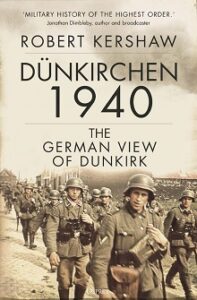The British view of Dunkirk is that of an iconic battle, a hugely important morale boost snatched from the jaws of what really was a catastrophic defeat. How is Dünkirchen viewed by the Germans?
Dunkirk was viewed by German soldiers as simply a sign-post on the way to Paris. Some 29 French and 22 Belgian divisions were destroyed in the Northern Flanders pocket, while 17 others were badly mauled. Allowing ten British divisions to escape, three of which were line of communication troops, was small fry indeed. The destruction of allied equipment seen on the roads and beaches was phenomenal. They thought a cease fire would soon be in the offing, so why risk one’s life? Most German soldiers were phlegmatic about the British escape, rationalising they would soon sue for peace from their island homeland.
Was Dünkirchen a failure for the Germans? After all the invasion of France was a stunning success, and the departure of the British Expeditionary Force and the remnants of the French and Belgian armies left the continent theirs.

British POWs alongside a German Panzer.
The fall of France was a resounding strategic defeat for the allies. Defeat of the United States by a totalitarian opponent today would give some indication of the psychological impact this had in May 1940. In operational terms, the Dunkirk outcome achieved partial success. Although the British had been mauled, their core fighting troops got away to fight another day. The Luftwaffe was unable to dent the carrying capacity of the evacuation fleet, while the German army failed to exploit the collapse of the Belgian army, enabling the key elements to embark. In short German operational failings at the political and strategic command level produced a less than satisfactory outcome.
A British relative of mine described Dunkirk as ‘bloody awful’. What was the experience of Dünkirchen like for the German troops?
The Dunkirk experience for German troops was frustration at being unable to bring their numerical superiority to bear and stop the evacuation. Casualties in some of the attacking divisions were exceedingly high. The German 56th Division was rendered combat ineffective by spirited British and French resistance on the east side of the perimeter and had to be withdrawn from the line. Heavy going in waterless sand dunes and flooded terrain caused hardship and taxed endurance. It was no ‘champagne’ advance. Victory meant the eventual outcome did not match the ‘bloody awful’ experience suffered by the British, but it was psychologically taxing for both sides.
During the advance on Dunkirk the SS carried out the Le Paradis massacre against British troops. Was this an isolated incident during the campaign?
The SS were not yet the respected and vaunted elite they would become during the Russian campaign. ‘Tree frogs’ the Wehrmacht called them, because of their camouflaged jackets, were less well trained. As a consequence, they were shocked by high casualties into being vindictively vengeful. The massacre at Le Paradis by the SS Totenkopf was not isolated, but such outrages were far fewer than those perpetrated in Russia. Totenkopf had a large number of untrained ex-concentration camp guards. They shot civilians prior to Le Paradis, but large casualties incurred by the British at Arras a week before and hundreds suffered trying to cross the La Bassée canal advancing toward Dunkirk, resulted in a massacre and ill treatment of British PWs. Three weeks later the Totenkopf, following stereotyped thinking about ‘negroes’ and ‘arabs,’ shot 194 French black Senegalese troops at Chasselay near Lyon.
The SS Leibstandarte Adolf Hitler massacred 80 men from the Royal Warwicks, Cheshires and Royal Artillery at Wormhoudt on the 28th May, trying to cut off the British stream retreating to Dunkirk. Single figure casualties suffered daily in Holland had transitioned to double figures up against the British fighting to secure their line of retreat. The former ceremonial guard for Hitler, the ‘asphalt soldiers’ likewise lost control under the impact of punishing losses.
The Luftwaffe deliberately targeted civilian refugee columns and machine-gunned survivors from sunken ships off Malo-les -Bains Dunkirk.
The German advance was held back at the perimeter, was this down to stern resistance by the defenders, or unimaginative offensive tactics by the Germans?
The German advance was held at the perimeter by a combination of stiff resistance aided by extensive and deliberate allied flooding and the concentric nature of the canal system girding Dunkirk. This meant only five of ten German divisions besieging the perimeter could operate from dry land. There was also a failure of German command and coordination, with virtually no plan to reduce the pocket on arrival. Insufficient space was available for the attacking divisions to deploy and some two-thirds of the encircling troops were withdrawn at a decisive moment for Operation Röt, (the campaign to reduce the rest of France). This occurred before the evacuation of the core veteran British divisions. The extent of abandoned allied wreckage and vehicles encouraged German soldiers not to take risks with a likely cease-fire pending.
Did Hitler order his troops to cease their advance on Dünkirchen?
The commander of Army Group A, General von Rundstedt, issued the first order to pause the tanks before Dunkirk, to enable his infantry to catch up. His panzer ‘Halt Order’ was confirmed by – but did not originate from Adolf Hitler. Political spats at high command level about the risk of over-extending the advance halted German momentum.

Gerd von Rundstedt
The battle for France and the swift victory has been argued by some as the high point of the war for Nazi Germany. With the evacuation of the BEF, defeat was inevitable with Britain and its Empire secure. Do you agree?
The high point of the war for Nazi Germany was probably reaching Moscow in 1941. The evacuation of the BEF meant that Hitler, like the Kaiser before him in 1914-17, faced a war on two fronts. Defeat was not inevitable for Britain in June 1940, she had the resources of Empire at her disposal and had saved her army, and need only hang on until the United states entered the war.
There have been a number of movies set during the campaign such as Dunkirk (1958), Atonement (2007) and Dunkirk (2017). Do you have a favourite?
The most atmospherical cinema portrayal of Dunkirk remains John Mills black and white 1958 film Dunkirk. Atonement in 2007 does not even scratch the surface. Christopher Nolan’s 2017 Dunkirk has some excellent air-sea flying sequences but fails with the paucity of troop numbers on the beach. On average some 10,000 men passed over these sands during the evacuation on a daily basis.
The German experience of the war is often overlooked, and the famous saying is that history is written by the victors. Are you working on another key event of the Second World War?
History is often written by the victors. The challenge is, after so much time, to get as near the original time frame as possible with contemporary sources. With that in mind, my next book is about the capture of the single hill that overlooked Malame aerodrome during the May 1941 German airborne invasion of Crete. Rarely can a single event be portrayed as decisive in determining the outcome of a campaign. This one does. I am looking at both sides actions in the fight for Hill 107 through the eyes of selected key participants on both the New Zealand and German sides, in forensic detail, again using prime original sources.
Robert Kershaw is the author of Dünkirchen 1940: The German View of Dunkirk is out now and is published by Osprey.
Aspects of History Issue 11 is out now.







